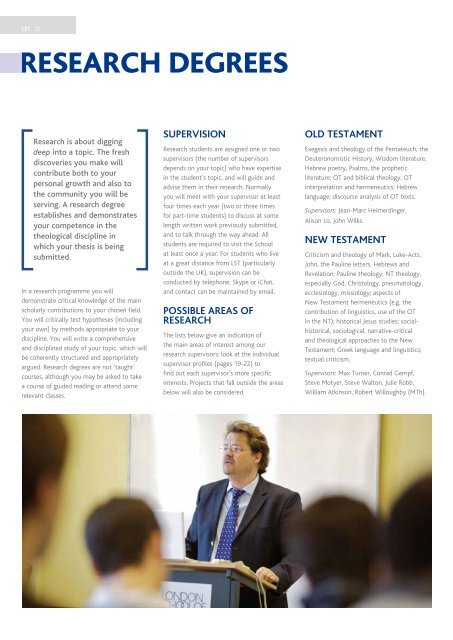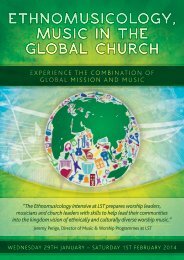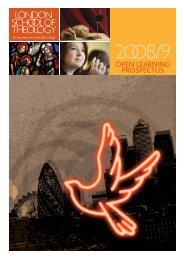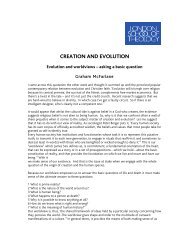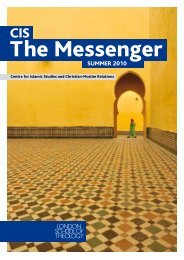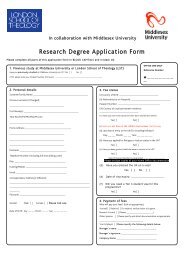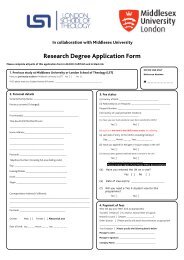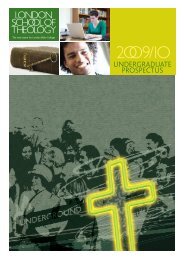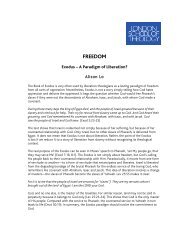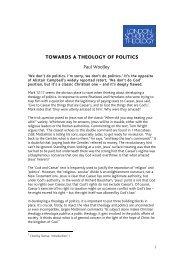POSTGRADUATE PROSPECTUS - London School of Theology
POSTGRADUATE PROSPECTUS - London School of Theology
POSTGRADUATE PROSPECTUS - London School of Theology
You also want an ePaper? Increase the reach of your titles
YUMPU automatically turns print PDFs into web optimized ePapers that Google loves.
LST 12RESEARCH DEGREESResearch is about diggingdeep into a topic. The freshdiscoveries you make willcontribute both to yourpersonal growth and also tothe community you will beserving. A research degreeestablishes and demonstratesyour competence in thetheological discipline inwhich your thesis is beingsubmitted.In a research programme you willdemonstrate critical knowledge <strong>of</strong> the mainscholarly contributions to your chosen field.You will critically test hypotheses (includingyour own) by methods appropriate to yourdiscipline. You will write a comprehensiveand disciplined study <strong>of</strong> your topic, which willbe coherently structured and appropriatelyargued. Research degrees are not ‘taught’courses, although you may be asked to takea course <strong>of</strong> guided reading or attend somerelevant classes.SupervisionResearch students are assigned one or twosupervisors (the number <strong>of</strong> supervisorsdepends on your topic) who have expertisein the student’s topic, and will guide andadvise them in their research. Normallyyou will meet with your supervisor at leastfour times each year (two or three timesfor part-time students) to discuss at somelength written work previously submitted,and to talk through the way ahead. Allstudents are required to visit the <strong>School</strong>at least once a year. For students who liveat a great distance from LST (particularlyoutside the UK), supervision can beconducted by telephone, Skype or iChat,and contact can be maintained by email.Possible areas <strong>of</strong>researchThe lists below give an indication <strong>of</strong>the main areas <strong>of</strong> interest among ourresearch supervisors; look at the individualsupervisor pr<strong>of</strong>iles (pages 19-22) t<strong>of</strong>ind out each supervisor’s more specificinterests. Projects that fall outside the areasbelow will also be considered.Old TestamentExegesis and theology <strong>of</strong> the Pentateuch, theDeuteronomistic History, Wisdom literature,Hebrew poetry, Psalms, the propheticliterature; OT and biblical theology; OTinterpretation and hermeneutics; Hebrewlanguage; discourse analysis <strong>of</strong> OT texts.Supervisors: Jean-Marc Heimerdinger,Alison Lo, John Wilks.New TestamentCriticism and theology <strong>of</strong> Mark, Luke-Acts,John, the Pauline letters, Hebrews andRevelation; Pauline theology; NT theology,especially God, Christology, pneumatology,ecclesiology, missiology; aspects <strong>of</strong>New Testament hermeneutics (e.g. thecontribution <strong>of</strong> linguistics, use <strong>of</strong> the OTin the NT); historical Jesus studies; socialhistorical,sociological, narrative-criticaland theological approaches to the NewTestament; Greek language and linguistics;textual criticism.Supervisors: Max Turner, Conrad Gempf,Steve Motyer, Steve Walton, Julie Robb,William Atkinson, Robert Willoughby (MTh).LST5642 - Postgraduate Prospectus revise v8REPRO.indd 12 12/08/2011 12:32


